Why you can trust Tom's Hardware
Paying the 6 GHz Tax
The $699 Core i9-13900KS Special Edition is the fastest gaming chip in the world with its record-setting 6 GHz peak turbo clock. However, for all but extreme overclockers, collectors, and the well-heeled looking to build the ultimate system at any cost, the costly chip's relatively small performance advantage over the vanilla 13900K isn't worth the $110 upcharge.
Below, we have the geometric mean of our gaming test suite at 1080p and 1440p and a cumulative measure of performance in single- and multi-threaded applications. We conducted our gaming tests with an Nvidia RTX 4090, so performance deltas will shrink with lesser cards and higher resolution and fidelity settings.
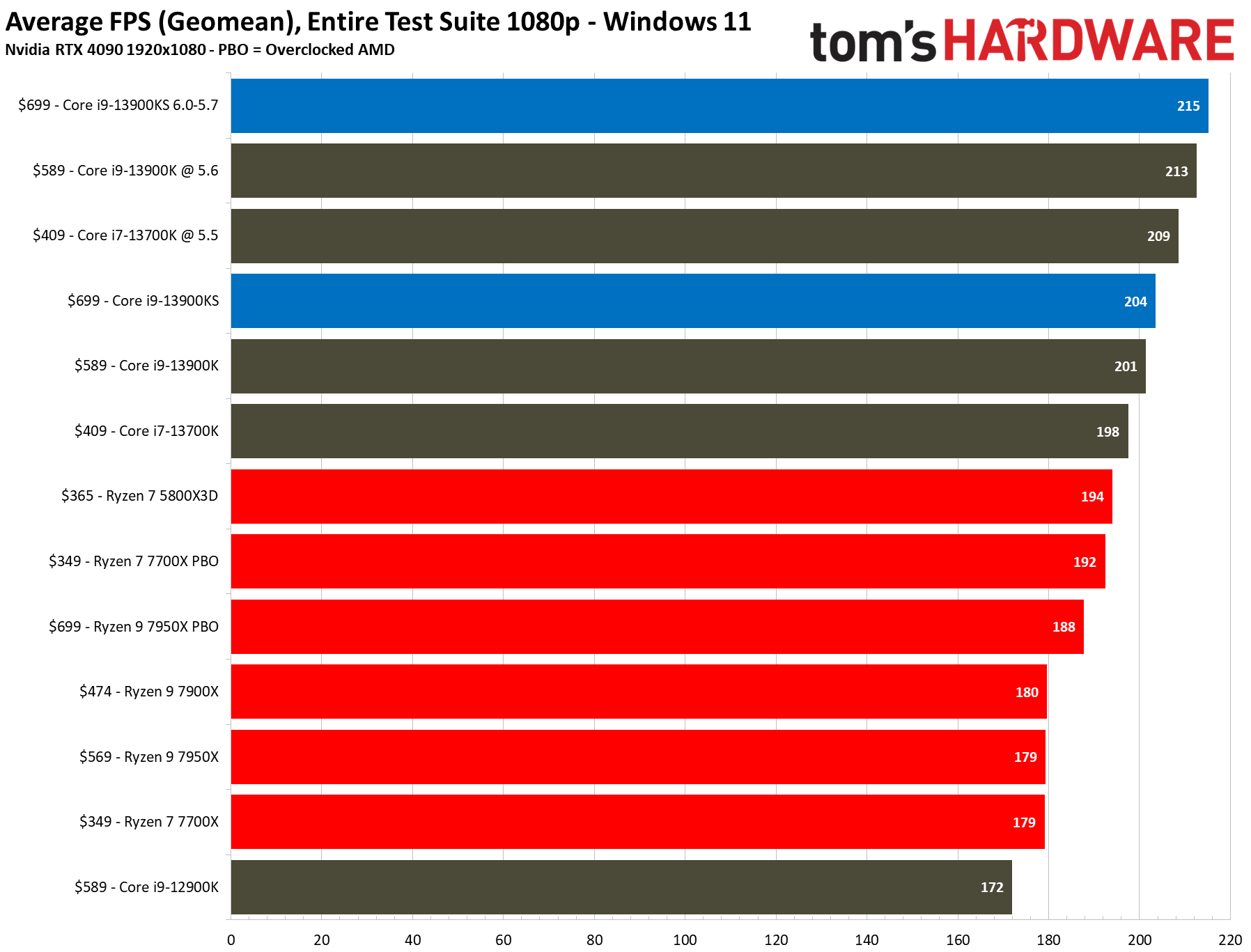
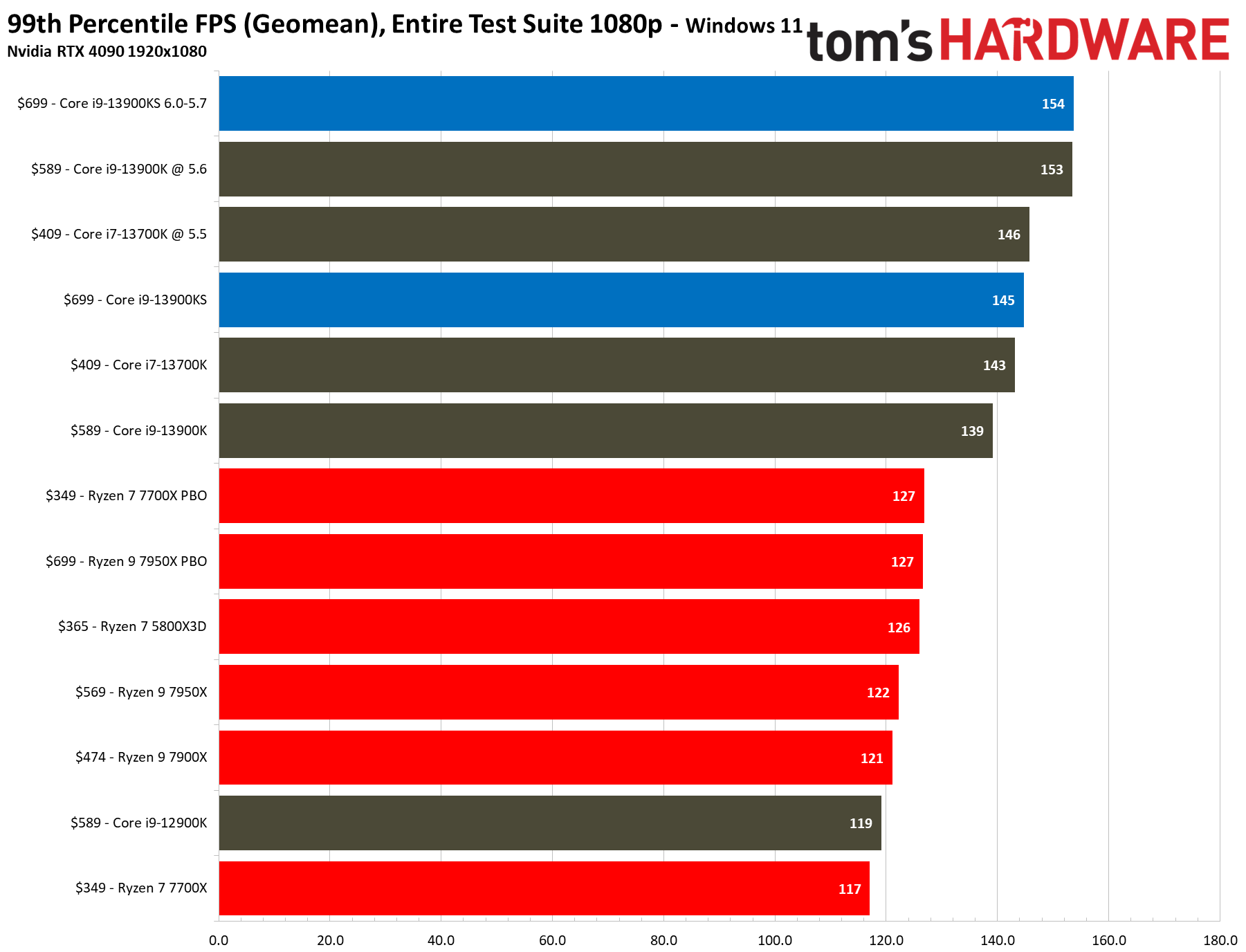
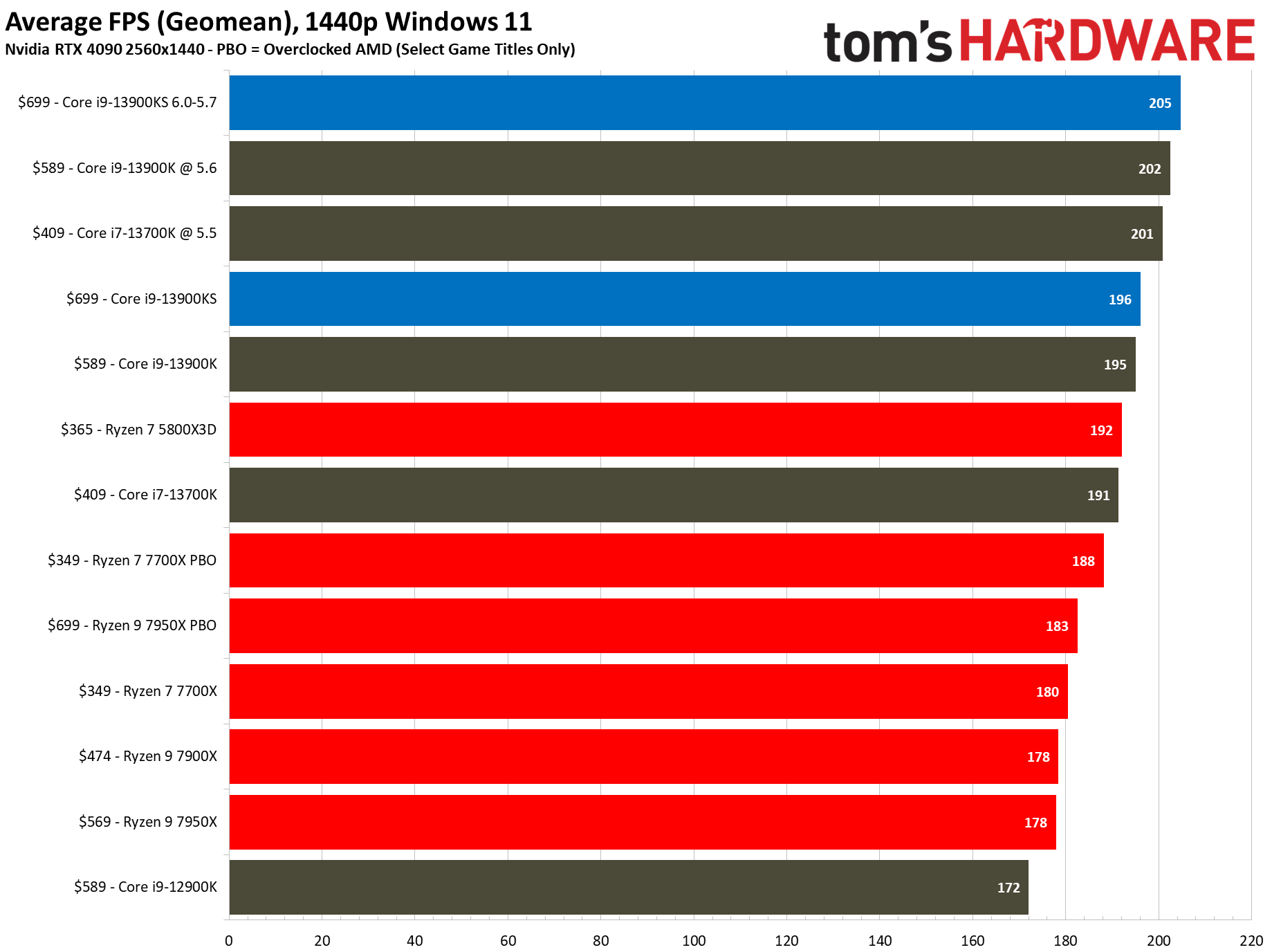
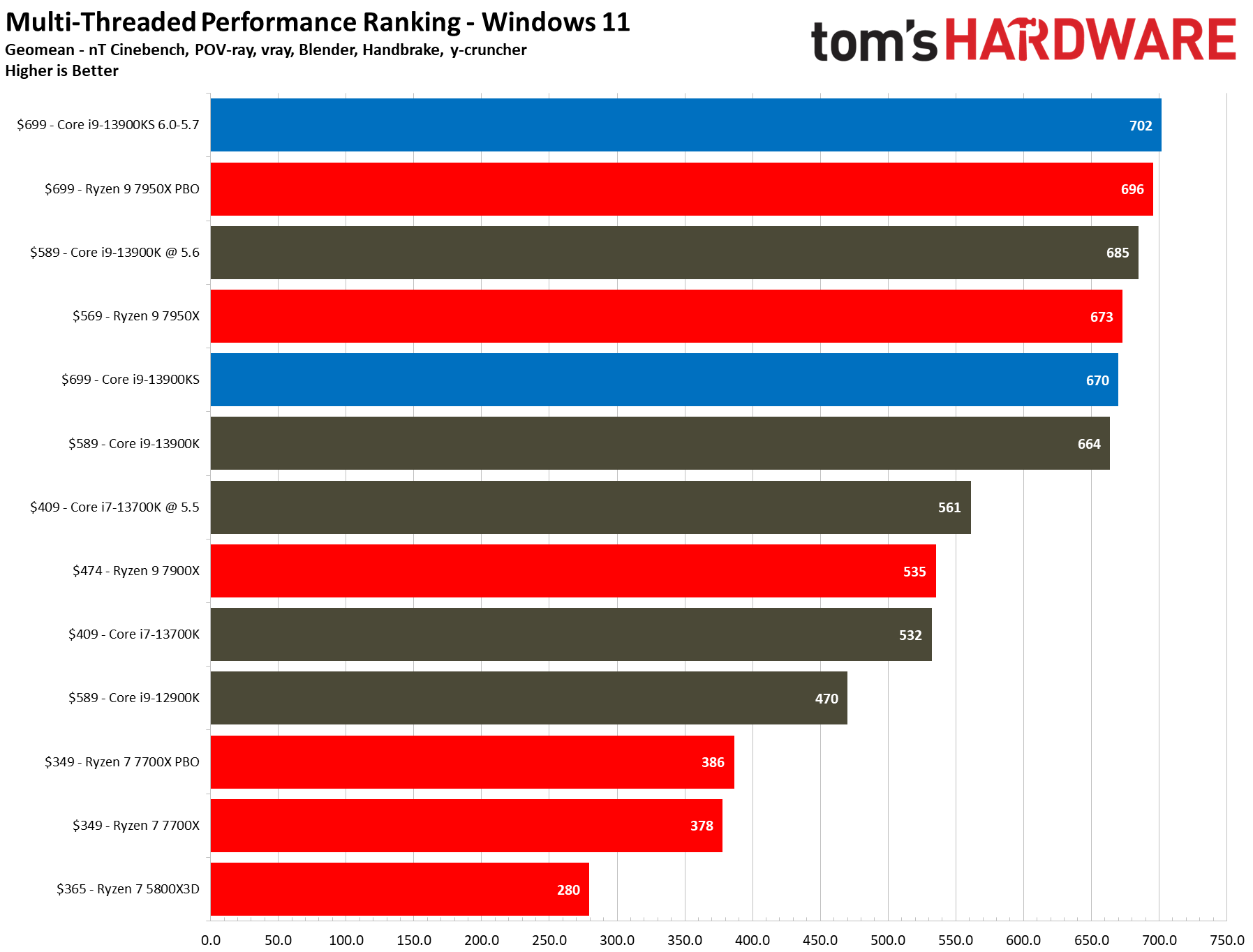
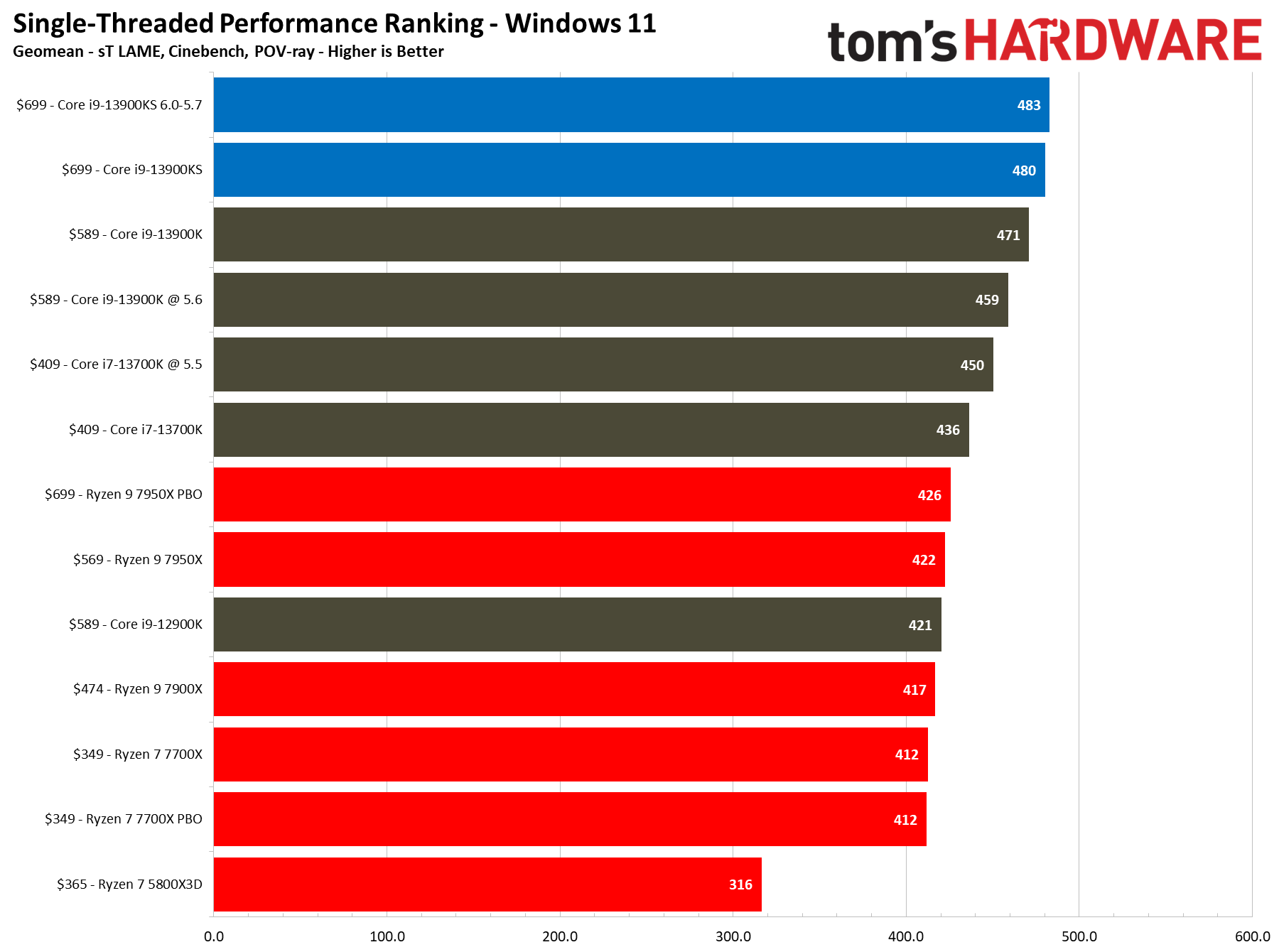
While the 13900KS is now the fastest gaming CPU money can buy, it only holds a slim 1.5% advantage over the standard 13900K in our 1080p gaming tests. That delta shrinks to a mere 0.5% when we flip over to 1440p gaming, meaning it is essentially in the noise of the benchmarks. That certainly isn't worth paying ~20% more.
We see a similar trend in multi-threaded workloads — the KS model only offers a slight 1% improvement over the standard 13900K and essentially ties the Ryzen 9 7950X. We see a more noticeable improvement in single-threaded work against Ryzen, as the 13900KS is 14% faster than the Ryzen 9 7950X. However, the KS is only 2% faster than the standard 13900K, so the big upcharge isn't worth it.
The big appeal for the KS is that you're guaranteed to get Intel's best silicon, basically giving you the winning ticket for the silicon lottery. That will undoubtedly make the chip popular with extreme overclockers, especially those chasing world records. However, again, the overclocking advantage can vary, and we only saw a few percentage points of difference in our own head-to-head overclocking against the standard 13900K.
Overall, the KS model doesn't make much of a difference to the positioning of the 13th-Gen processors against the Ryzen lineup, and it will only be sold in limited quantities. Intel now allows pairing its consumer chips with ECC memory on motherboards with the workstation-geared W680 chipset, so the Core i9-13900KS could make for a powerful workstation machine. However, it will still only deliver small gains over the 13900K.
The Core i9-13900KS just isn't a practical buy for the majority of us, especially considering that it will need the priciest of accommodations, like the highest-end motherboard and PSU to pump 320W of power to the processor and a potent cooler to handle the 100C operating temperatures when the chip is under heavy load. All of which is a high price to pay for a few percentage points (at best) of extra performance.
If you want to invest in the fastest gaming chip, you should wait to see how AMD's Ryzen 7000X3D chips perform when they launch next month. These chips come with 3D V-Cache tech that provided explosive gaming performance gains for Zen 3, and it's possible that it could push Zen 4 into a solid lead in gaming over Raptor Lake. Pricing remains the wild card, but we expect the high-end 16-core Ryzen 9 7950X3D to land in the same range as the 13900KS.
In the meantime, the Core i9-13900KS represents Intel throwing value and power consumption out the window in an effort to retain the performance crown, particularly in gaming, as Ryzen 7000X3D draws near. The Core i9-13900KS might be pricey and only deliver small gains, but it does set the record as being the first 6 GHz desktop PC chip right out of the box — and that's an incredible milestone. It might even allow Intel to cling to the title of having the fastest gaming chip in the world, a nearly priceless distinction for the 13th-Gen Raptor Lake brand.
Make no mistake: the Special Edition Core i9-13900KS is the fastest desktop PC chip ever built. At least for now. However, AMD's Ryzen 7000X3D is approaching fast. Stay tuned.
| Intel Socket 1700 DDR5 (Z790) | Core i9-13900KS, i9-13900K, i7-13700K, i5-13600K |
| Motherboard | MSI MPG Z790 Carbon WiFi |
| RAM | G.Skill Trident Z5 RGB DDR5-6800 - Stock: DDR5-5600 | OC: XMP DDR5-6800 |
| AMD Socket AM5 (X670E) | Ryzen 9 7950X, Ryzen 9 7900X, Ryzen 7 7700X |
| Motherboard | ASRock X670E Taichi |
| RAM | G.Skill Trident Z5 Neo DDR5-6000 - Stock: DDR5-5200 | OC/PBO: DDR5-6000 |
| AMD Socket AM4 (X570) | Ryzen 9 5950X, 5900X, 5700X, 5600X, 5800X3D |
| Motherboard | MSI MEG X570 Godlike |
| RAM | 2x 8GB Trident Z Royal DDR4-3600 - Stock: DDR4-3200 | OC/PBO: DDR4-3800 |
| All Systems | 2TB Sabrent Rocket 4 Plus, Silverstone ST1100-TI, Open Benchtable, Arctic MX-4 TIM, Windows 11 Pro |
| Gaming GPU | Asus RTX 4090 ROG Strix OC |
| ProViz GPU | Gigabyte GeForce RTX 3090 Eagle |
| Application GPU | Nvidia GeForce RTX 2080 Ti FE |
| Cooling | Corsair H115i, Corsair H150i |
| Overclocking note | All configurations with overclocked memory also have tuned core frequencies and/or lifted power limits. |
- MORE: AMD vs Intel
- MORE: Zen 4 Ryzen 7000 All We Know
- MORE: Raptor Lake All We Know
Get Tom's Hardware's best news and in-depth reviews, straight to your inbox.
Current page: Paying the 6 GHz Tax
Prev Page Productivity Benchmarks on Intel Core i9-13900KS
Paul Alcorn is the Editor-in-Chief for Tom's Hardware US. He also writes news and reviews on CPUs, storage, and enterprise hardware.
-
Brian D Smith Less 'overclocking' and more on 'underclocking' articles please.Reply
That would be helpful for the ever growing segment who does NOT need the testosterone rush of having the 'fastest' ... and wants more info on the logical underclocking to...well, do things like get the most out of a CPU without the burden of water-cooling, it's maintenance and chance of screwing up their expensive systems.
These CPU's and new systems would be flying off the shelves much faster than they are if only people did not have to take such measures for all the heat they generate. It's practically gone from being able to 'fry an egg' on a CPU to 'roasting a pig'. :( -
bit_user Seems like the article got a new comment thread, somehow. The original thread was:Reply
https://forums.tomshardware.com/threads/intel-core-i9-13900ks-review-the-worlds-first-6-ghz-320w-cpu.3794179/
I'm guessing because it had previously been classified as a News article and is now tagged as a Review. -
bit_user Thanks for the thorough review, @PaulAlcorn !Reply
Some of the benchmarks are so oddly lopsided in Intel's favor that I think it'd be interesting to run them in a VM and trap the CPUID instruction. Then, have it mis-report the CPU as a Genuine Intel of some Skylake-X vintage (because it also had AVX-512) and see if you get better performance than the default behavior.
For the benchmarks that favor AMD, you could try disabling AVX-512, to see if that's why.
Whatever the reason, it would be really interesting to know why some benchmarks so heavily favor one CPU family or another. I'd bet AMD and Intel are both doing this sort of competitive analysis, in their respective labs. -
letmepicyou Reply
Well, we've seen the video card manufacturers code drivers to give inflated benchmark results in the past. Is it so outlandish to think Intel or AMD might make alterations in their microcode or architecture in favor of high benchmark scores vs being overall faster?bit_user said:Thanks for the thorough review, @PaulAlcorn !
Some of the benchmarks are so oddly lopsided in Intel's favor that I think it'd be interesting to run them in a VM and trap the CPUID instruction. Then, have it mis-report the CPU as a Genuine Intel of some Skylake-X vintage (because it also had AVX-512) and see if you get better performance than the default behavior.
For the benchmarks that favor AMD, you could try disabling AVX-512, to see if that's why.
Whatever the reason, it would be really interesting to know why some benchmarks so heavily favor one CPU family or another. I'd bet AMD and Intel are both doing this sort of competitive analysis, in their respective labs. -
bit_user Reply
Optimizing the microcode for specific benchmarks is risky, because you don't know that it won't blow up in your face with some other workload that becomes popular in the next year.letmepicyou said:Is it so outlandish to think Intel or AMD might make alterations in their microcode or architecture in favor of high benchmark scores vs being overall faster?
That said, I was wondering whether AMD tuned its branch predictor on things like 7-zip's decompression algorithm, or if it just happens to work especially well on it.
To be clear, what I'm most concerned about is that some software is rigged to work well on Intel CPUs (or AMD, though less likely). Intel has done this before, in some of their 1st party libraries (Math Kernel Library, IIRC). And yes, we've seen games use libraries that effectively do the same thing for GPUs (who can forget when Nvidia had a big lead in tessellation performance?). -
hotaru251 Intel: "We need a faster chip"Reply
eng 1: what if we make it hotter & uncontrollably force power into it?
eng 2: what if we try soemthign else that doesnt involve using guzzling power as answer?
intel: eng1 you're a genius! -
bit_user Reply
Part of the problem might be in Intel's manufacturing node. That could limit the solution space for delivering competitive performance, especially when it also needs to be profitable. Recall that Intel 7 not EUV, while TSMC has been using EUV since N7.hotaru251 said:Intel: "We need a faster chip"
eng 1: what if we make it hotter & uncontrollably force power into it?
eng 2: what if we try soemthign else that doesnt involve using guzzling power as answer?
intel: eng1 you're a genius! -
froggx Reply
Intel has at least once in the past disabled the ability to undervolt. Look up the "plundervolt" vulnerability. Basically around 7th and 8th gen CPUs it was discovered that under very specific conditions that most users would never encounter, undervolting allowed some kind of exploit. The solution: push a windows update preventing CPU from being set below stock voltage. I have a kaby lake in a laptop that was undervolted a good 0.2v, knocked a good 10°C off temps. One day it started running hotter and surprise! I can still overvolt it just fine though, I guess that's what matters for laptops. Essentially, as useful as undervolting can be, Intel doesn't see it as something worthwhile compared to "security."Brian D Smith said:Less 'overclocking' and more on 'underclocking' articles please.
That would be helpful for the ever growing segment who does NOT need the testosterone rush of having the 'fastest' ... and wants more info on the logical underclocking to...well, do things like get the most out of a CPU without the burden of water-cooling, it's maintenance and chance of screwing up their expensive systems.
These CPU's and new systems would be flying off the shelves much faster than they are if only people did not have to take such measures for all the heat they generate. It's practically gone from being able to 'fry an egg' on a CPU to 'roasting a pig'. :( -
TerryLaze Reply
Being able to withstand higher extremes is a sign of better manufacturing not worse.bit_user said:Part of the problem might be in Intel's manufacturing node. That could limit the solution space for delivering competitive performance, especially when it also needs to be profitable. Recall that Intel 7 not EUV, while TSMC has been using EUV since N7.
Intel CPUs can take a huge amount of W and also of Vcore without blowing up, these are signs of quality.
TSMC getting better is how AMD was able to double the W in this generation.
You don't have to push it just because it is pushable.
jv3uZ5VlnngView: https://www.youtube.com/watch?v=jv3uZ5Vlnng